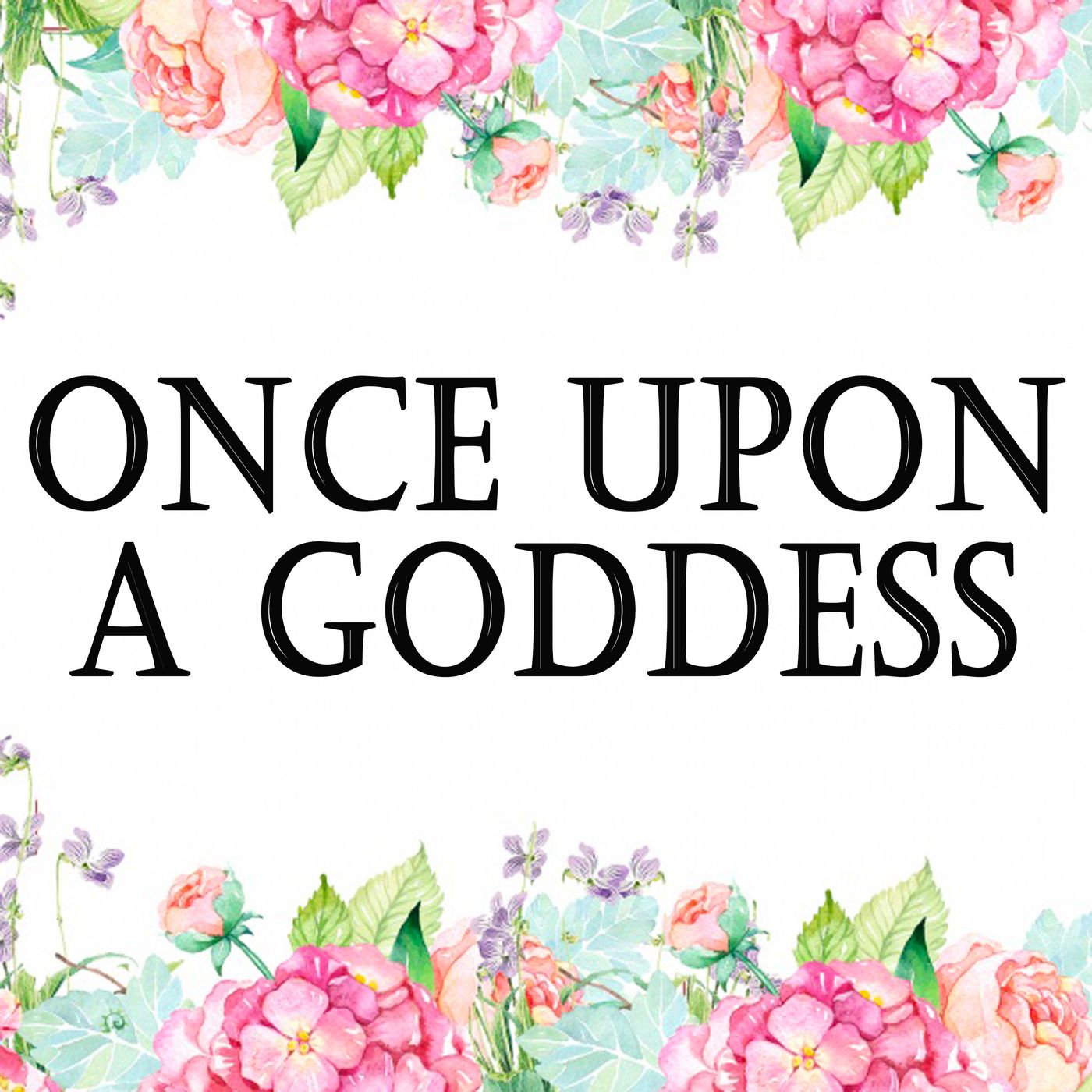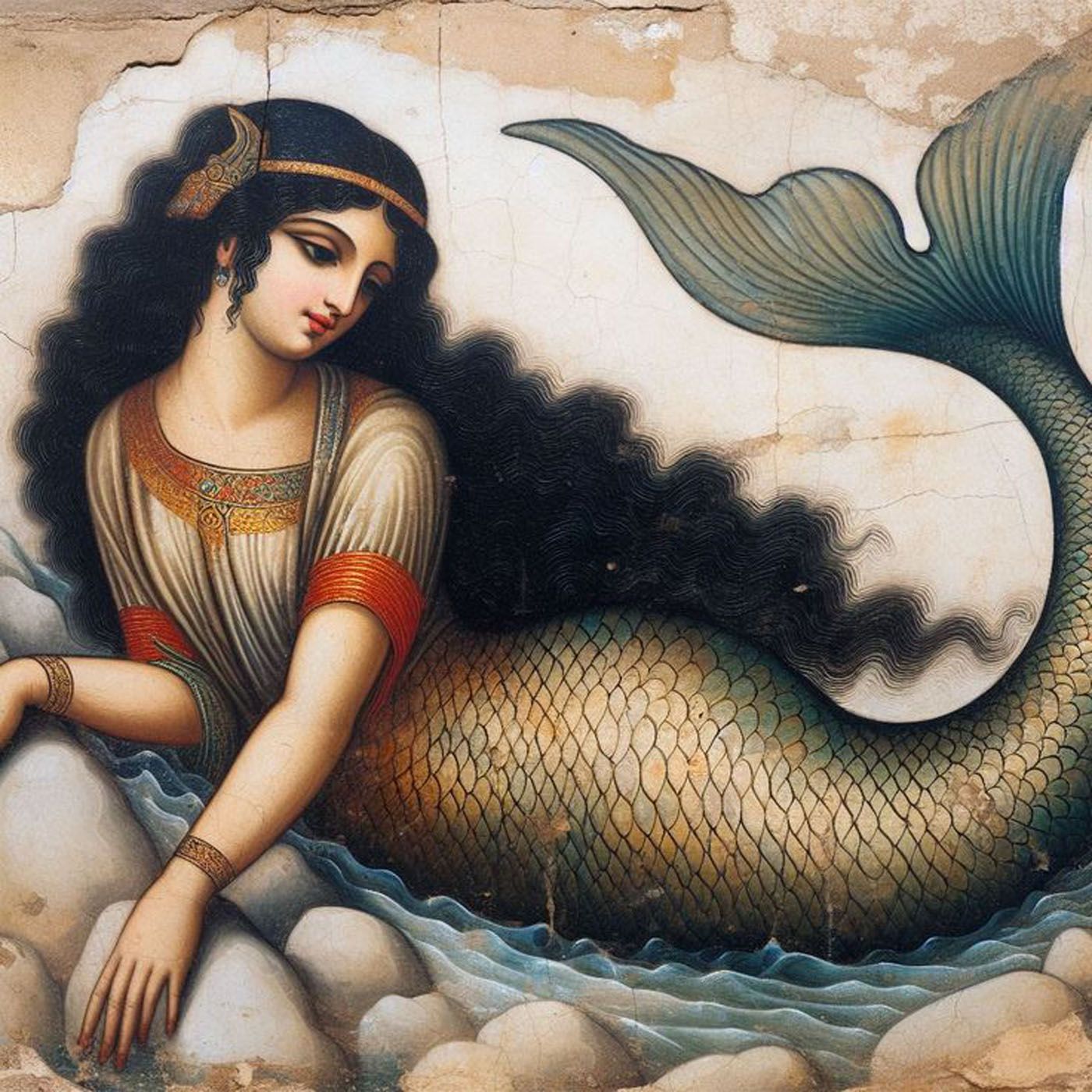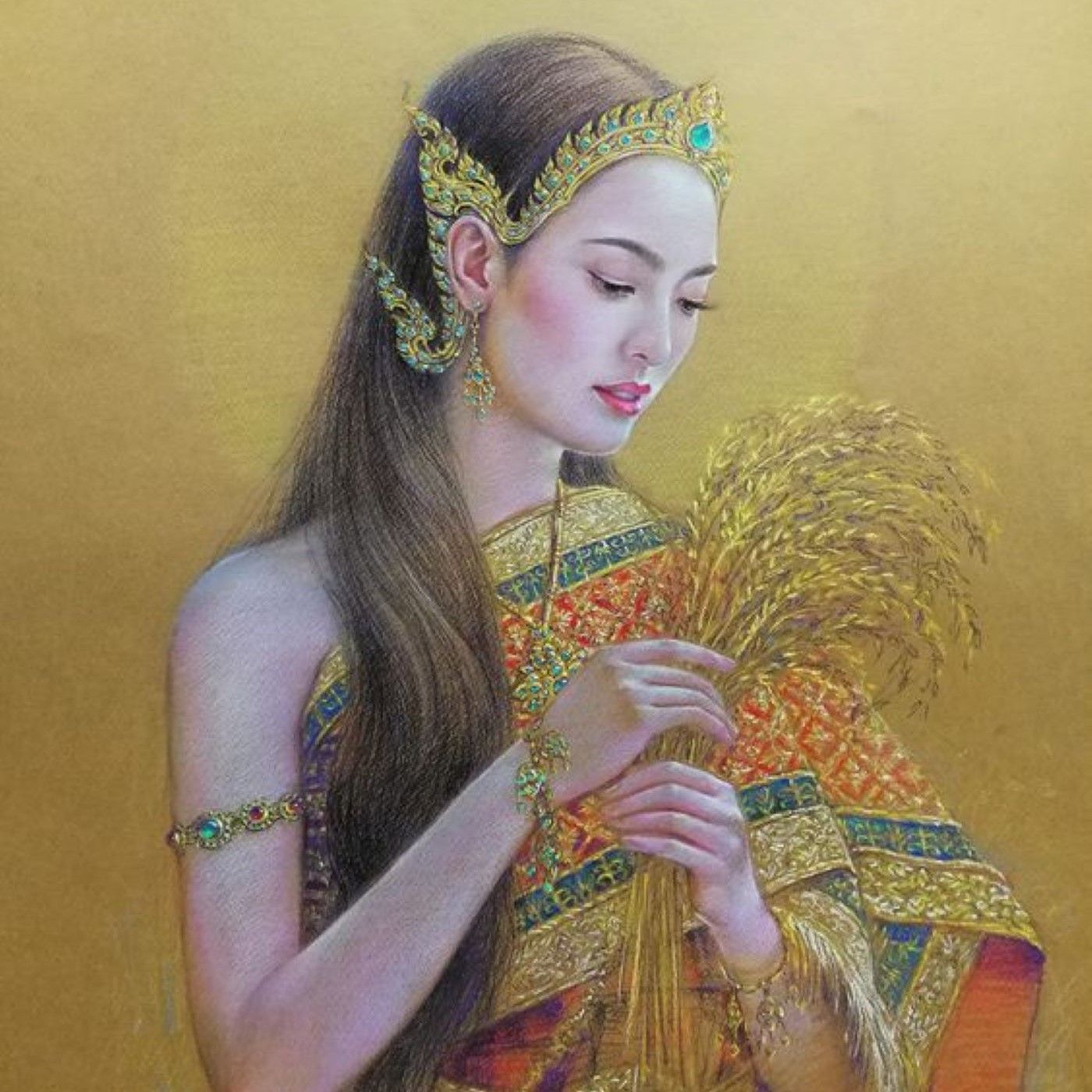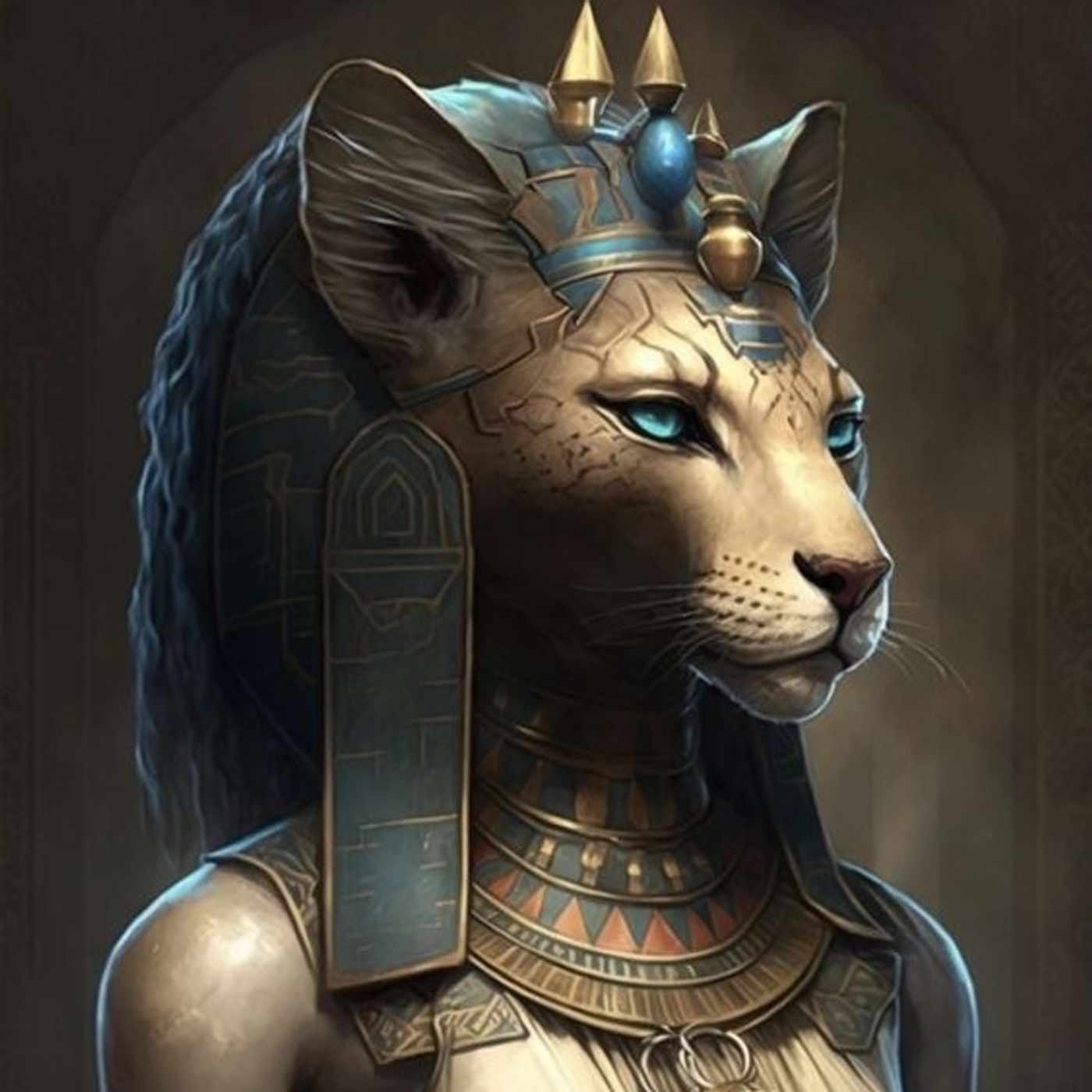Show Notes
The powerful emotions of human life can lead to great transformations. Atargatis' story is a reminder of how deep emotions are part of the beauty of human experience. Alongside this is the wonder of the natural world and the magic that we can find within it for healing and nurturing.Show Transcript
Atargatis
Her story begins high within the celestial realms.
From the eternal energies of creation an egg was formed, holding within it the potentials for a new female life. As its weight grew, the cradle holding it split apart and the egg fell towards the earth. It thankfully landed within the gentle waters of a grand river known as the Euphrates within the ancient lands of Assyria.
At first it bobbed and rolled within the current as though the river’s course would decide its fate. The egg had companions though and they came to inspect their new company. Two fish gently pecked at the shell and immediately knew this was not where it was meant to be. They pushed at the egg, guiding it towards the river’s edge. Once there and out of the current, the fish shoved one last time with all their force and the egg slid out of the water and rested upon the soft sand of the shore. The fish then turned and glided back into the depths of the river, returning to life as normal.
A dove was circling above when it saw the egg resting upon the sand. It would have been so easy to mistake it for a rock, but not to the dove. Instinctively it knew what it truly was and likewise those instincts knew it needed care and nurturing.
The bird flew down and with her beak nudged the egg further from the river and into safe shelter under some bushes. No longer exposed to hunters and the elements, she built a nest around the egg, determined to sustain whatever was within.
The egg thrived as the bird nestled by its side. From within came a rhythm that the dove knew was a heartbeat and it sang to the new life about to appear.
When the egg cracked open and a human form emerged, the dove sang its song once more and the woman that sat before her smiled.
“Thank you, my friend,” the woman said. “You will not be forgotten.”
Thus, the Goddess Atargatis was born.
To a celestial being, all within the mortal world is fascinating. The brightness of the sun, the flowers dancing in the breeze, the chill of the night, the taste of an apple. Every detail delighted and entertained Atargatis but nothing compared to the wonder that was the people who filled this world.
Within the cities and villages she sat watching them gather water at fountains, performing their trades and even just talking to one another. From a distance she observed their facial expressions and physical gestures and how these reflected their emotions and feelings. Then she would dive into being a human, mingling amongst their market crowds, enjoying how their bodies brushed up against hers and engaging in conversations.
When she tired of the crowds and formalities of the town lives, she would then retreat to the countryside and savour the rhythms of nature. Here was a simplicity which felt like a deep slow breath to Atargatis, and the softness of this energy helped her recall her divine energies. To sit and watch the passing of the seasons and how the plants and animals interacted was akin to a ritual that bound her even deeper to spirit.
While on one of these journeys Atargatis came upon some shepherds. She stayed back, as she wanted to watch them without their knowing of her presence.
It gave her joy to see how they cared for their animals, guiding them to fresh fields each day to feed upon the sweetest of grasses and shrubs. She delighted in how they called to them and how the animals listened for their voices.
Though there were several shepherds in the area that she was watching, one in particular captured her attention entirely. If you had asked Atargatis why, she might have blushed and shaken her head, stating there was no reason.
And there was no reason that her mind could speak in words. But her heart could write you poems to fill a book.
There was something about the shape of his face. The way he walked beside his animals. The call to his herd that belonged to his voice alone.
Atargatis watched him with devotion for years. She ached when he stopped grazing in the coldest months but delighted when he reappeared in Spring. His clothes were then new or renewed. The herd would be replenished with babies, and he would smile as he watched with extra care over the new additions.
The Goddess would delight as his skin turned even darker in the summer sun. His hair and beard would grow long, then he would arrive one day with them both trimmed short to begin the process of growing again.
Then the cooler months would arrive. Each day several animals might be missing, fulfilling their role to provide food, and each week the shepherd would have another layer of clothing to stay warm.
Soon it would be too cold for him or the animals and the slumber of winter would begin. Snow would dust the land, burying the grasses and putting the wild animals to rest.
And so the dance of the seasons went on… and each cycle Atargatis would fall even deeper in love with the shepherd. Not that she knew it was love, but this warmth and joy that filled her when she watched the shepherd felt pure and truly divine. Surely there was no wrong in allowing it to grow stronger.
As this feeling grew, the act of just watching him seemed so small and futile now. So Atargatis devised ways to interact with him.
It began so simply. She would gather fruit within a basket and leave it under the tree where she knew he took his rest to eat. Nothing had made her happier than to see him take that first bite.
Then she would sit beside the road upon which he walked the herd back to his farm. At first he didn’t look beyond a cursory glance. To do more would be disrespectful and indeed he felt it might even lead to conflict with the men of her family.
But Atargatis had no family within this realm and she was not bound to such mortal rules, which was very apparent when she appeared day after day, with no male chaperone in sight.
The short glances turned to longer exchanges. A smile led to a greeting. A greeting led to conversation. Finally Atargatis asked his name.
“I am Hadad,” he said simply and Atargatis was delighted to finally have something to call him other than ‘the shepherd’.
Then even more wonderfully Hadad asked for her name and he now smiled in exchange.
The smile was short lived though as he quite seriously asked about where were her family and why was she out alone.
“My family live within the stars. I am free to live here as I choose,” she replied and though Hadad could barely comprehend such things, he was so enamoured with this beauty before him that her words charmed him.
“Then might you come and live with me?” he asked and Atargatis was beside him in an instant.
The transition from distant observer to wife was with such ease and grace for Atargatis, that it seemed that her and Hadad had always been together. It was truly as though there were a celestial plan for them to be side by side. So much so that her heavenly energies soon wove into Hadad’s mortal energies making him a divine being also. From their union was born a daughter, Semiramis, who carried both the strength and beauty of her parents.
As physical embodiments of divine energy it would seem that they should live forever. However this was not to be the case. One day as Hadad went grazing with his own flock, he stumbled near the edge of a precipice, falling to his death upon the rocks below.
When some shepherds bought his bloodied body to Atargatis she cried out to the gods and goddesses to revive him but there was no response. All she could do was fall to the ground beside him and weep.
Atargatis wept so much that her tears washed Hadad’s body. So too she left a trail of water when she walked his body to his grave. And still she continued to weep for weeks and months after. Not even the love for her daughter could lift the weight of grief that buried her heart. Atargatis simply could not comprehend how their union should be broken apart when it had seemed designed by the gods.
She was now physically, emotionally, and spiritually exhausted. Though Atargatis now prayed to be relieved of her pain, she knew there was only one solution. The goddess found her way to a grand lake that was nearby and flung herself into the deep waters. Death would be her release from the pain of her grief and so too, it would be her reunion with Hadad.
As Atargatis’ body sunk deeper and she began to pull water into her lungs, the fish of the lake gathered around her. They sensed her pain, but so too did they sense her divinity. They could not let her die but they wanted to heal her pain. No goddess should end this way.
The fish now swam in circles around her, creating a whirlpool that held Atargatis in place. Then just as the last of her breaths made its way out of her, sending a stream of bubbles to the lake surface, the fish called upon the waters to make her one of their own. She would be free of the pain of the human life she had chosen, but saved to live on within the lake.
The lake began its magic transformation and the fish rejoiced as they watched her legs fuse together and become a tail. But then they grew sad to think of the inevitable loss of Atargatis’ beauty when her face would become that of a fish. They asked the waters to save her splendour and the lake did so by leaving her torso and head to remain that of a woman.
So Atargatis lived on as part woman and part fish. The first woman to take the shape of what would come to be known as a mermaid.
Her young daughter, Semiramis survived, now without a mother or father. She would have perished but for some doves who heard her crying and bought her food each day. By chance one day, a shepherd of the royal palace happened upon her and realising she was all alone carried her home to be raised amongst the palace staff.
As she matured her beauty surpassed even that of her mother. Born of divine and human, Semiramis carried herself with poise and exuded a wisdom that inspired all who interacted with her. So, it was no surprise then when the King himself chose her to be his Queen.
Queen Semiramis never forgot her parents or the deep bond that that they had with each other. She thought often of her mother’s overwhelming grief and how she now lived within the depths of the great lake not far from the palace.
So it was that the Queen built a temple to honour her mother and encourage others to celebrate her- not as the grief-stricken widow but for the loving mother and wife she had been while she lived upon the land. Semiramis wanted her to be known for her love of nature and the joy Atargatis had found in the simple elements of human life.
The Queen built a grand temple for her mother, and in its forecourt she included a delightful fishpond and filled it with fish from the lake. This would remind everyone of her mother’s fate and to honour the beings who had rescued her mother in her darkest hour, as well as the very first ones who guided her egg ashore and to safety.
Atargatis’ legend become so beloved that even more temples were built, each with their own sacred fishpond. The fish within were considered so holy that only the priests and priestesses serving the temple were allowed to feed or touch them.
While Atargatis was filled with gratitude that her animal icon should be so respected, it would never match that which she owed to the very first fish who rescued her egg, nor to the ones who ordained her transformation. Atargatis sent their energy into the heavens. There they would became stars, dancing in the constellation that we know as Pisces. Here they would live for eternity.
Below the stars and within the realm of humankind the spirits of Atargatis and Hadad worked together. They watched over the threads of community and agriculture, protecting and guiding anyone who might call upon them. They sent their blessings to crops and herds. They guided the decisions of leaders and helped shape societies. They reminded all of the beauty and harmony that was in nature and the blessings of being human.



